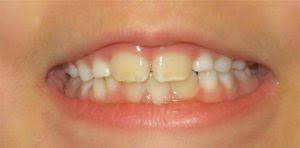
Yellow teeth are not necessarily an indication of oral health problems, but if the discoloration is persistent and has no known cause, it is a good idea to visit the dentist to check for plaque buildup, cavities, or dental trauma. The best option to treat stained teeth may be to get a professional whitening treatment and to practice good oral hygiene.
What Causes Yellow Teeth in Children?
Yellow teeth can be caused by a wide variety of things, some of which are out of the patient’s control. If your child consumes a lot of staining foods and drinks, they can cause the teeth to turn a yellow color over time. Staining foods and drinks include tea, soda, or anything that is highly pigmented such as dark juices or blueberries.
If your child has suffered from a tooth injury, this can cause discoloration of the tooth. If your child has recently experienced dental trauma and their tooth is discolored, they should visit a dentist immediately. Your child could also have ingested too much fluoride at a younger age. This is a condition known as fluorosis and it turns teeth yellow. Other substances that cause tooth staining include antibiotics such as tetracycline.
However, yellowing of the teeth may not be due to staining at all. Other possibilities include poor oral hygiene that has led to plaque buildup. Plaque is a sticky yellow substance that feeds off of food particles in the mouth to produce acids that attack the enamel. Other causes of staining of teeth include:
- Thin enamel
- Cavities
- Iron supplements
- Genetic disorders
- Smoking, vaping, and chewing tobacco
- Pigmented beverages such as coffee, tea, and wine
It is also important to note that baby teeth are naturally whiter than permanent teeth, so as your child grows older and their smile fills in, their new teeth could appear yellow in comparison to their older counterparts.
Treatment for Yellow Teeth
The right treatment for discolored teeth will depend on the root cause of the discoloration. For example, if your child’s teeth are yellow due to cavities, plaque, or poor oral hygiene, then a thorough dental cleaning and treatment of the cavities could dramatically whiten their teeth.
However, if their teeth have been permanently stained or are naturally discolored, other cosmetic treatments may need to be considered such as composite veneers or teeth whitening. While teeth whitening is more typically used in adults, it can also be an effective treatment for adolescents.
This is something you would need to discuss with your dentist to determine if your child is eligible for teeth cleaning depending on their age. Composite (or porcelain) veneers act as covers over the teeth and are a better option for teeth that are resistant to whitening treatments or have been stained from inside the surface.
Preventing Tooth Discoloration
Maintaining proper oral hygiene is the best way to combat staining and reduce the risk of developing cavities and plaque, which can cause the teeth to turn yellow. Your child should brush their teeth at least twice a day and remember to floss each day. Use fluoride toothpaste and a soft-bristle brush to gently scrub their teeth.
To avoid dental trauma, make sure your child wears a mouth guard if they grind their teeth and/or play sports and attend regular dental appointments every 6 months. Plaque is not always easily removed without professional help. If your child is at least 12 years old, a more cost-effective alternative to professional teeth whitening would be to use ADA-approved over-the-counter whitening strips.
Schedule Your Child’s Next Dental Appointment at Gary D. Sabbadini, DDS, APC
If you’ve noticed your child’s teeth appear unusually yellow, bring them in for a dental checkup and cleaning. We can take a closer look at the condition of their teeth, remove any plaque buildup, and formulate a treatment plan if discoloration persists. To schedule an appointment at Gary D. Sabbadini, DDS, contact us at (510) 724-4400 or book online with Dr. Gary Sabbadini.





